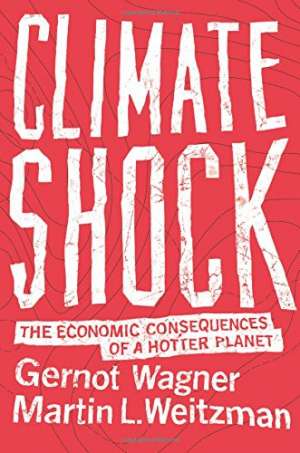31 March 2015
Climate Shock: The Economic Consequences of a Hotter Planet
Gernot Wagner and Martin Weitzman
2015, Princeton University Press, 264 pages, £19.95
ISBN 9780691159478
Reviewer: David Fell, Director, Brook Lyndhurst

Why did I approach this book with such low expectations? Just another book about climate change, perhaps? And the title –a marketing device, obviously, trying to make me think of Alvin Toffler’s Future Shock or Naomi Klein’s Shock Doctrine. Written by Americans, too, so it will probably be aimed at the neo-con denier community.
But no. Climate Shock is, in fact, aimed at the well-informed but world-weary souls who accept that anthropogenic climate change is underway (as the authors put it, “Anyone who pretends otherwise is…wilfully blind to reality,”) but who feel ill-at-ease about all the uncertainties in the science and the economics.
This, then, is the book’s first surprise, made obvious in its first few pages. The style is breezy and direct, occasionally and oddly repetitious. Sometimes it feels like reading the script of a middlebrow television documentary, where the narrator repeats the same handful of basic facts with infuriating frequency. Sometimes it feels like a piece of narrative non-fiction: when carbon tax is first mentioned it is introduced so briefly and so matter-of-factly that it has the literary bravura of Ballard or Borges.
The surprises continue throughout: one chapter is almost entirely written in the form of a James Bond film script; there are technical sections where you will want to double-check your understanding of Stern’s discount rate assumptions or make sure you are up to date on how to balance risk across your portfolio. It sounds almost ludicrous; and it is. It is also brilliant.
The shock, too, is brilliantly conceived, and introduced, and then used throughout. By the time the reader fully appreciates the shock you begin to realise that the authors somehow told you about it earlier than you realised, which serves to make it even more shocking.
And the shock, in the end, is so simple, so elegant – so obvious – that even that starts to become a shock: why have we been so focused on the 2oC average temperature change, on the middle, when… well, that would be to spoil the surprise. Or rather, the shock.
So here is a clue: imagine you are on an island, and you are helping your entire family to board a ship, a ship that will be taking them on a journey to the mainland. You are not going on the journey; but you did buy the tickets. You know, of course, that there is a risk of something awful happening on the journey. Perhaps they will hit an iceberg. The question is: what is the probability of catastrophe that you would find acceptable? What would have to be the odds before you refused to allow your family to board? One in 10,000? One in a thousand?
Now go and read this book.
Oh, and get ready for one more surprise. In the final chapter, the authors tackle the ‘What on earth is one to do?’ question. They not only offer one of the best set of arguments in support of action I have yet come across, they also make the case that it is the responsibility of economists to adopt an ethical stance. A good economist is not the one who can best deploy the necessary data and arguments in support of her client’s needs; a good economist is above all a good citizen, duty bound to use economics as a branch of moral philosophy, not just a branch of mathematics.
My low expectations were utterly confounded. Climate Shock is astounding and outstanding. I cannot merely recommend that you read it: I invite you to give your copy to the most powerful or influential person that you know. If you, and we, are lucky, this book might just be the shock they need.
